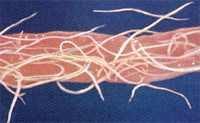



Parasitic Worms
UK - Have you thought about what may be happening within the guts of your hens? If not, they may look like this: |
However, if your hens have an infestation of capillaria (hair) worms, there may be little to see unless you have a microscope, but the gut lining could be even more damaged than by the roundworms (ascaridia) in the picture above. Some free range farmers seem to be complacent about routinely worming their hens. All of the scientific and on farm evidence suggests that worms are indeed a problem on most free range farms. They can not and must not be ignored. Therefore I make no apology for raising the topic again.
There are various species of worms that can infest the intestines of hens. Their importance is that they can impede the passage of nutrients through the gut wall. In severe infestations of round worms (ascaridia), they not only compete for the nutrients in the gut but also can physically block the passage of the food through it. It has now become recognised that considerable damage to the gut wall can be done during the larval stage of development. The hens pick up (ingest) worm eggs from within the house or from the range area. These eggs can then develop into larvae within the bird in a few days.
At this stage the larvae burrow into the gut wall and it can become thickened and damaged. The larvae then develop into worms and the eggs from these worms can pass with the faeces out of the hen to a site where they are ingested by any hens that are unfortunate enough to have pecked at that particular point! The timing of this cycle is important because the period from ingestion to shedding of worm eggs in the faeces ("prepatent period") can be as short as three weeks. It is easy to see that the range and house can quickly become contaminated.








